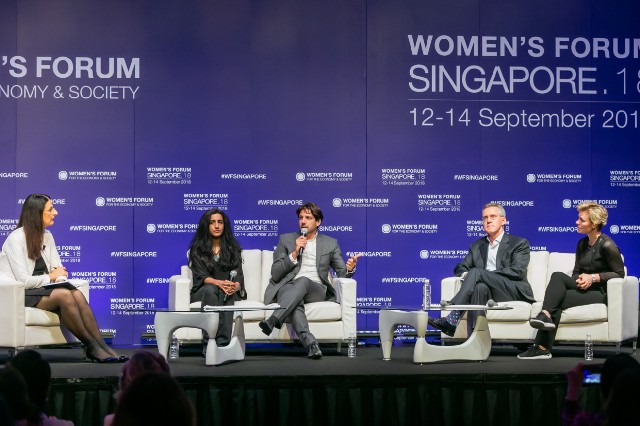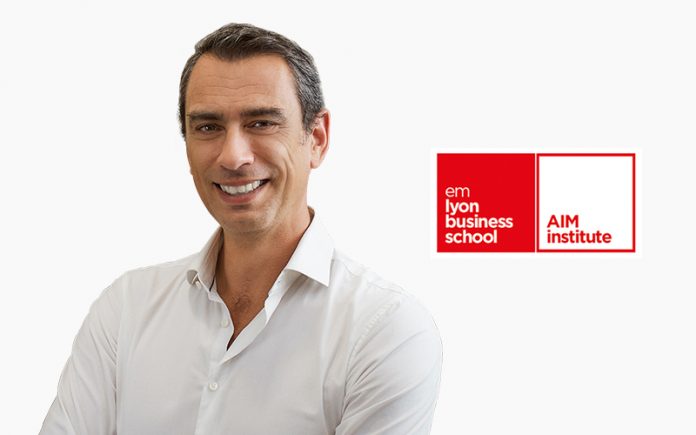Interview with Mr. Renaud Champion, Executive Director AIM Institute EMLYON Business School
As artificial intelligence (AI) increasingly plays a big role in today’s business and society, it is important to know how different sectors can properly utilise such innovation in order to maximise its full potential. At emlyon business school, a multifaceted initiative was created with the aim to understand the opportunities and implications of artificial intelligence for the management of organisations, industries, and business ecosystems – The Institute for Artificial Intelligence in Management (AIM). To tell us more about the research centre, we sat down with Mr. Renaud Champion, the Director of Emerging Intelligences at the AIM Institute.
Good day, Mr. Champion! Thank you for taking the time to talk to us today. Let’s start this interview by giving us a glimpse of your day as a Director and industry leader in the field of Artificial Intelligence and Robotics?
I usually wake up around 6am and start the day with a kiss to my kids, a great source of energy for me. Before work I exercise and go running, cycling or swimming, to be ready for the competitions I take part in at least twice a year. During this practice I take the time to go over all kinds of digital media to get a feeling of the general atmosphere. Robotics and AI have such tremendous impacts on so many domains that I want to be aware of what’s happening everywhere: I am addicted to the news and don’t want to miss a thing. Then, when I am not travelling to meet young entrepreneurs or great researchers in the field of AI, I have a tight schedule of meetings, either face to face or via video conferencing. Those daily interactions with others are a real source of inspiration for me. I love to exchange views in order to better understand the world, challenge people and be challenged by them. I usually work according to three principles: affect – I like to work with people I appreciate both as humans and professionals, fun and the need to feel socially impactful.
Prior to assuming your Executive Director role at AIM Institute, you worked in capital markets involving companies like BNP Paribas and founded your own venture capital firm. How was the transition like?
I was trained as an AI engineer in France and the U.S. My ten years of experience as a quantitative researcher and practitioner of international capital markets has taught me to invest and take risks, while applying AI algorithms in trading rooms. Then the following decade as a venture capital professional in advanced robotics & AI, I was at the crossroads of my engineering background and my entrepreneurial interests. Along that road I pragmatically experienced the impacts of those technologies from an ethical, socio-economic and business point of view. So, I would say that the transition to my new role as Executive Director of the AIM Institute was quite natural and in continuity with what I’ve done over the past 20 years.
The AIM Institute is a multifaceted multifaceted initiative focused on understanding the opportunities and implications of artificial intelligence. What do you think makes your research institute excellent, unique, and successful in its expertise?
The ambition of AIM Institute is to understand the opportunities and the implications of artificial intelligence for the management of organisations, industries and business ecosystems. There are many predictions about how AI will change business and the way we work but relatively few empirical studies. So, our first goal is to support grounded, empirical studies of the way AI can create value on a broad range of business and also how this technology is changing what it means to work and the way work is organised, done and being rewarded. Our positioning as social science researchers studying real-world issues facing organisations in an interdisciplinary way is very unique. Only a few months since the launch of the institute, we already have 20 researchers from different backgrounds and we are expanding very quickly. We can also count on the involvement of our Scientific Committee made up of leading academics from Stanford, EPFL, UT Austin, VU Amsterdam, Florida State University and University of Southern California to help us drive excellence.
You are in charge of developing the strategy on Artificial Intelligence as well as the digital transformation of the school and its practice. What are your plans for attaining more innovations and transformation in and through AI for the school in the next few years?
It is our mission at emlyon business school to prepare the managers and the leaders of tomorrow to work in a technology driven world. For this reason, we are including in all our programme courses on data, robotics or machine learning, etc. and on the impacts these technologies can generate for companies. I think it is highly strategic for us as a business school to take a leading role in such a positioning, and make sure our programmes are increasingly hybrid. On the other hand, AI is also transforming pedagogy itself. We are building new AI-augmented tools to support our students in their lifelong learning journey. Digital technologies can strongly help us personalise that experience. But all those new functionalities are also challenging the role of the professor. What could be optimised by the algorithms, what should stay in the hands of the teacher? This question on collaboration and complementarity of the technology with humans needs to be tackled also in our domain: education.
In terms of the developments you’ve produced at the Institute, what innovation initiatives or enhancements are you focussing on at the moment and what should your present and future audience and partners look forward to?
On the research side we have several projects under review for high-ranked academic journals and we are working on many new projects studying human-machine interaction, impact of smart devices for the supply chain and operations, new business models from AI-augmented digital platforms or how to design and create better user experiences interacting with new intelligences. We have also launched several series of seminars and workshops with leading scholars from all over the world to address the questions of the impacts of AI on work and value creation. But at the same time we organise monthly outreach lectures open to the general public about the technologies behind AI. On the pedagogy side we are also very active with the creation of an online certificate on AI and Business for managers, new courses on our fields of expertise to be integrated in all emlyon’s programmess (bachelor, MBA, MSc or Executive Education), and regular keynotes posted on the YouTube channel of the school.
Last but not least we are working on the creation of our Technology Transfer department. For every research project, we consider whether the work has the potential to contribute to our understanding of how organisations and institutions can take meaningful and responsible advantage of AI. When we encounter projects that have concrete business applications, we might develop patentable models that could be coded and used to develop an application that a partner business might find useful. Or, we may explore the possibility of launching and supporting a start-up to exploit this innovation.
How significant is AI in the workplace and management today and how could organisations and companies handle its impacts effectively and make the most out of it?
AI, robotics, blockchain… all these technologies have already transformed the workplace. At work we use AI-powered smartphones every day, thanks to the web and smart cameras we interact with colleagues on the other side of the planet just as if they were in the same room, robotics has been transforming factories for more than 30 years and chatbots are changing how we interact with customers… Companies have no choice today and need to adapt, understand how they can use these technologies for their benefit from an economic but also from a human resources point of view. So, it is the responsibility of each manager, not only the COO or CTO, to ask oneself this question at one’s level: how can AI help me do my job more efficiently or differently? But to do so they need to be trained on these technologies, on design thinking methodologies, on agility, etc. Companies need to invest in AI but also in their own people to make the most out of these technologies.
What do you think are some of the real-world challenges facing organisations and policymakers in terms of understanding the implications of artificial intelligence for work, human resource management and labour markets, and governance? How do you at AIM Institute help address these challenges?
It is true that some jobs will disappear on one side and that new ones will be created on the other. But rather than focussing on the numbers for each side, I think we need to understand how the whole structure of employment is being transformed by AI – most jobs won’t disappear, they will evolve. At AIM Institute we address these challenges by deploying researchers to study the impacts on the ground, within companies, with technology providers but also at end-users’ locations to gather data, understand the impacts and build knowledge out of it. From this knowledge we could then identify trends in the labour markets’ transformation: what are the new skills required to retrain the workforce impacted by AI? What are the new jobs about to emerge and how companies should adapt their recruitment process?
 Margherita Pagani (left), Digital Marketing Professor of Emlyon Business School with other AI experts at the Women’s Forum Singapore. September 2018
Margherita Pagani (left), Digital Marketing Professor of Emlyon Business School with other AI experts at the Women’s Forum Singapore. September 2018
We have learned that you are particularly interested in the ethical, legal, and socio-economic issues linked to Robotics and AI. How do you think achieving sustainability and maintaining ethical practices are possible while making technological innovations through AI?
Over the past 20 years working and investing in AI and robotics, I was lucky to be involved in many projects impacting various market domains, from finance and industry to agriculture, transport, or healthcare for instance. From this experience I really got the conviction that AI is not only an economic but also a societal opportunity because it can bring the human back at the centre of the game. This is true in the industry, thanks to intelligent robotics systems that work in collaboration with humans who are back in the production line (see the automotive industry). It is also the case in the healthcare domain where assistive robotics can help elderly people for their mobility and their toilet, while the nurse is focussing on the social interaction. Researchers, engineers or product managers need to be trained to become even more ethically responsible when they design new AI technologies. The respect of dignity and human well-being are key values underlying the “ethical by design” approach that most companies or big tech associations like IEEE are now promoting.
Evidently, there are changes in leadership style as our world advances. How do you think the AI will transform the future of leadership?
Leadership will remain a human attribute for a very long time and I don’t believe we will be challenged by machines on that point. AI is definitely changing how we interact with our clients, colleagues and peers. But as exponential automation will undoubtedly boost productivity or open new territories of business, the human factor will stay the key driver of this interaction. Our empathy, our ability to question the world, to unconsciously desire or simply to make mistakes and use this as a source of creativity, are unique features difficult for machines to replicate. So, I think the future of leadership is all about emotional intelligence. I am not a strong believer of Artificial General Intelligence or technological singularity for basic ethical questions. As a humanist I believe that AI should foster human skills and, in the end, human well-being.
On a lighter note, leaders atop a company or organisation naturally have a lot on their plate. What habits keep you focused and healthy at and off work?
Actually, I have many different plates because I have several hats. Since everything I do is connected to AI it is quite easy not to lose focus though. This mix of activities is a real source of diversity and energy for me – I never get bored with what I am doing! But I have to admit that I also have a double-life: when I am not an actor of the higher education and AI, I turn into a farmer during the weekends, driving big agricultural machinery like 350 horse power tractors or 18 tons combined harvesters. Going back to my farm and working on my land is a kind of balance for me. It allows me to keep serenity in my life and to maintain a connection with the real world and my roots. But AI is never too far. I am currently working on an amazing project with other farmers to test and deploy robotics solutions in order to make agriculture less difficult and more sustainable from an ecological, economic and human point of view.
What advice would you offer for those who want to catapult their career forward in the technology sector?
First of all, I think it’s a very good idea because the technology sector will be massively hiring in the coming decades! First thing I would suggest is to get a strong cultural understanding of what these technologies are about, what are their histories, how have they changed the world so far. In a nutshell, get an objective understanding of what it is, what it can do – far away from all the fantasy, and make your own opinion. Then be curious and open yourself to many application domains. Even if you are interested in industry, look at what is happening in the healthcare sector with robotics. Even if you are interested in finance, look at what is being developed in the cybersecurity world with the blockchain. AI is a very transversal technology that impacts all market domains and its potential of transferability is huge. Another advice would be to team up with people you get along well with and who have a complementary expertise – build a team. This is especially true for technology because inventing a great new tech is one thing, but making a product out of it that some clients would buy in the long term is a different question. So the more relevant points of view around the table, the quicker you’ll find the way!
Lastly, what are the three things you will not leave home without?
My smartphone to connect to the world. My enthusiasm to be open to others…and my keys to come back to my family and kiss them goodnight.
Thank you very much, Mr. Champion. It was a great pleasure speaking with you.
About the Interviewee
 Renaud Champion is Director of Emerging Intelligences at Emlyon business school, member of the Executive Board in charge of developing the strategy on Artificial Intelligence as well as the digital transformation of the school and its practice. He is also Director of euRobotics AISBL, the European Association of Robotics acting as the private side of SPARC, the Public-Private-Partnership for Robotics in Europe, and an independent expert for the European Commission on innovation and investment in advanced technologies. He has published articles and white papers on the ethical, legal and socio-economic issues linked to AI and Robotics.
Renaud Champion is Director of Emerging Intelligences at Emlyon business school, member of the Executive Board in charge of developing the strategy on Artificial Intelligence as well as the digital transformation of the school and its practice. He is also Director of euRobotics AISBL, the European Association of Robotics acting as the private side of SPARC, the Public-Private-Partnership for Robotics in Europe, and an independent expert for the European Commission on innovation and investment in advanced technologies. He has published articles and white papers on the ethical, legal and socio-economic issues linked to AI and Robotics.



































